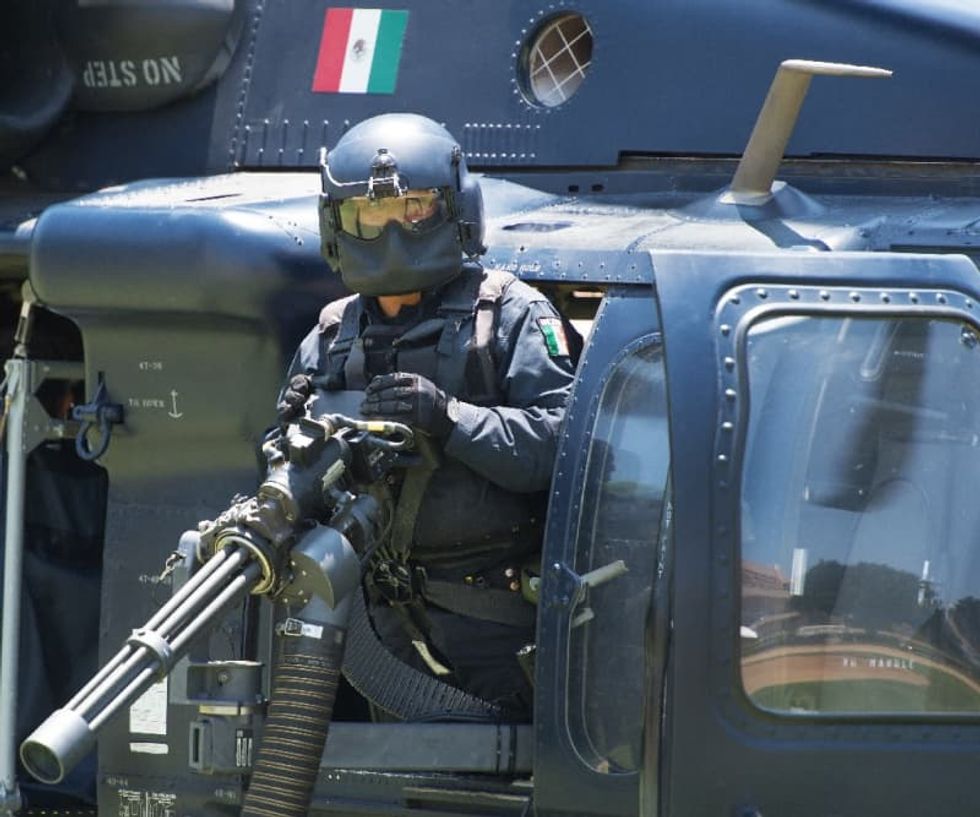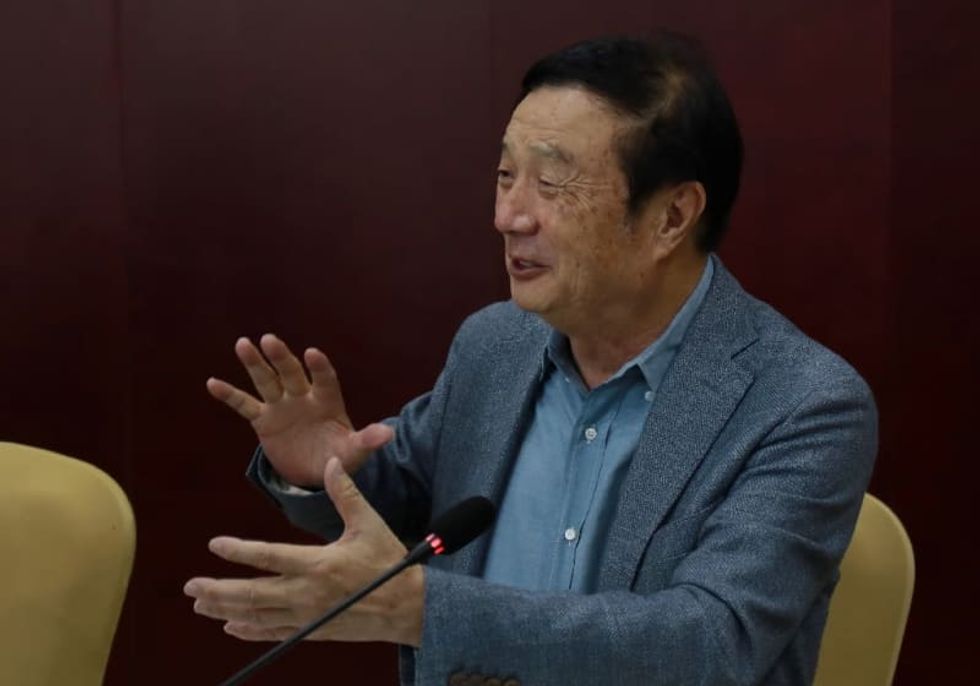‘Evil people’ and ‘haters’: Chicagoans endure disruptions to combat convention threats
CHICAGO — Tens of thousands of visitors will pass by a 138-year-old brick church facing a parking lot for the United Center, home of this week’s Democratic National Convention.
Welcoming visitors into the landmark building would be a “blessing” — and timely — given the history of Greater Union Baptist Church, which includes a visit from Black civil rights activist and suffragist, Mary Church Terrell, said Walter McCray, the Baptist church’s pastor.
ALSO READ: 'Powder keg': Massive security presence on display in Chicago amid signs of trouble
“To highlight her is very significant in terms of preserving democracy and voting. We believe in voting and are promoters of voting as a congregation,” McCray told Raw Story in a phone interview. “We think that would be very significant with Kamala Harris as a Black female running for the President of these United States of America.”
But Greater Union Baptist Church will be in a “lockdown” instead. Metal fences and concrete barricades ring its perimeter. Parking is prohibited. The normally welcoming house of worship now resembles a fortress. And communication between the Democratic Party and the surrounding community members — many of whom are Democrats — hasn’t always been great, residents said.
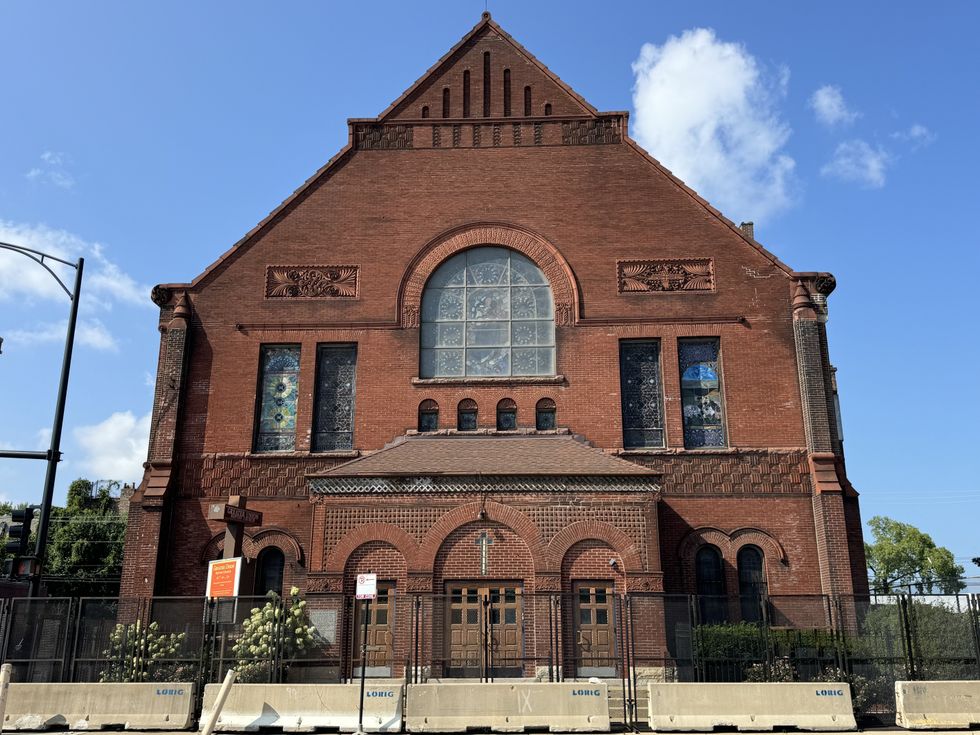 Greater Union Baptist Church near the United Center has barricades and fencing around it on Aug. 18, 2024, due to the Democratic National Convention. (Photo by Dave Levinthal/Raw Story)
Greater Union Baptist Church near the United Center has barricades and fencing around it on Aug. 18, 2024, due to the Democratic National Convention. (Photo by Dave Levinthal/Raw Story)
Such is the temporary fate of private properties that fall within the designated security “red zone” that requires Secret Service approval for access during the convention.
The specter of terrorist attacks and violent protests have resulted in overwhelming security procedures in this lower-income neighborhood about three miles west of Chicago’s downtown core.
“We're not naive enough to think that everyone will respect the church house, the people of God there, so under the circumstances, we are cooperative,” McCray said.
Greater Union Baptist Church is one of the community organizations located near the convention sites that has needed to completely alter its operations in order to maneuver around security restrictions required by the Secret Service and law enforcement.
ALSO READ: Democrats compete with ultimate Trump billboard during national convention
The church in Chicago’s Near West Side neighborhood pivoted to virtual services and meetings for its 67-person congregation while the convention and preparations took place, which members understood even though “everybody misses the fellowship in person,” McCray said.
McCray said much of the congregation consists of “senior seniors” who cannot walk long distances or quickly.
“The aches and pains that come with older age, they have, so to be able to park right in front of the church and not far from the church house, the entry doors, is important,” McCray said. “With the street blocked the way it is, that's problematic.”
Choosing to proceed with virtual services was a “two-sided” decision – both for the protection of the congregation and for the safety of the dignitaries, delegates and visitors attending the convention, McCray said.
“We are very much aware that not everybody is about peaceful protests and demonstrations, and there are some who are very sinister, who would be clandestine in seeking to take what is positive in peace and turn it very negative,” McCray said. “There are very evil people. There are haters who seek to not only harm elected officials, or who would seek to distract from a Democratic National Convention by creating chaos and violence.”
Community outreach efforts
Following a community impact session hosted by the Chicago 2024 Democratic National Convention host committee in early August, the Secret Service got in touch with McCray about security protocols, but representatives of the host committee and Democratic National Committee have not, he said.
The Secret Service provided McCray with a phone number to call in order to help staff members of the church access the building during the week.
The Democratic National Convention Joint Information Center confirmed to Raw Story that the Secret Service and its partners contacted Greater Union Baptist Church as a part of its outreach effort to about 1,300 people, including 500 business representatives, since July 25. Prior to then, the Secret Service community outreach subcommittee held meetings with community groups in the city and suburbs, the information center said.
Less than a mile north of the United Center, a food pantry, Nourishing Hope, operates a warehouse that processes about three million pounds of food each year. The nonprofit runs another warehouse and two walk-in pantries across Chicago, in addition to providing deliveries and online food ordering services.
ALSO READ: ‘Absolutely essential’: Son of Oath Keeper Stewart Rhodes is all in for Kamala Harris
Given that it’s outside of the security “red zone” but not far from the convention site, the organization took a precautionary approach to its operations planning during the convention.
“Just making sure that the drivers are paying attention to closures and giving themselves extra time to navigate any sudden closures or delays,” Kellie O’Connell, chief executive officer for Nourishing Hope, told Raw Story. “The other thing that we're messaging to our staff, really, and volunteers is to just make sure that you plan extra time so that you can navigate any increased traffic.”
Clients who live in the Near West Side and South Loop neighborhoods near the United Center and the other convention site, McCormick Place — particularly seniors — might experience rescheduled food deliveries during the convention. But O’Connell insisted that they will get food for the week.
“Because we're just outside of it, I think we're just being more proactive to make sure that we're educating ourselves on what's happening and how it might impact our operations,” said O’Connell.
Leaders for Nourishing Hope attended a community impact meeting but did not receive personal outreach from Democratic National Convention organizers or partners about the convention’s effect on their operations.
The Secret Service, City of Chicago, Chicago Police Department, Chicago’s Office of Emergency Management and the Chicago 2024 Host Committee created a community outreach program in the spring, which included door-to-door visits to residents and businesses around the United Center and the McCormick Place, the Democratic National Convention Joint Information Center told Raw Story.
"The preparation for the 2024 DNC, like any National Special Security Event, is a joint effort. No one federal, state or local agency alone can carry out the measures necessary to secure the event. The expertise of each participating law enforcement, public safety and military agency is critical to the success of the operational security plan," said the Democratic National Convention Joint Information Center in an email, declining to provide a named spokesperson for attribution.
The Chicago Department of Business Affairs and Consumer Protection also canvassed, shared information via email and social media, and hosted meetings with business owners "in the perimeters and in proximity to the venues," according to the Democratic National Convention Joint Information Center.
ALSO READ: Why Kamala Harris may get a big convention polling ‘bounce’
“We know that security for this event of this size will have impacts. To that end, the Secret Service and our partners have conducted dozens of outreach up to this point, with businesses, residents and community groups,” said Joel Hefferman, assistant special agent in charge of the U. S. Secret Service, Chicago Field Office, at a press conference on Aug. 2. “The objective is to effectively and efficiently communicate our plan and mitigate confusion as we move forward towards the DNC.”
For the nearly 650 schools in the Chicago Public Schools district, teacher classroom preparations and trainings ahead of Aug. 26 — the first day of school — are proceeding as usual, Evan Moore, a school district spokesman, told Raw Story via email.
But there are disruptions.
Schools near the United Center were informed by district officials that street closures and security barriers may cause their employees to arrive late, Moore said. The principals relayed precautionary instructions and offered opportunities for expanded accessibility in order to avoid congestion, such as open hours for school supply drop off ahead of the convention to the community.
Sports practices for three high schools in the Chicago Public League will be restricted to 7 a.m. to 12 p.m. during the convention, Moore said.
The district adjusted its 2024-2025 school year days to start on Monday, Aug. 26, after the convention. Classes will end Friday, June 12, 2025.
“This shift not only accommodates the city’s logistical needs as they relate to the influx of convention goers, but it also allows time for students to attend, volunteer and participate in the civic process of hosting the convention,” Moore said in a statement on behalf of Chicago Public Schools.
Commuter concerns
Even those outside of the vicinity of the United Center and McCormick Place are taking precautions to avoid street closures and protests during the convention.
“I told everybody at my job, don't you dare create in-person meetings that week. We're doing everything by Zoom,” said John Booras, Republican candidate for U.S. House Illinois District 3 and tax attorney. “Especially as a former police officer, I'm seeing the signs of that being a powder keg right now.”
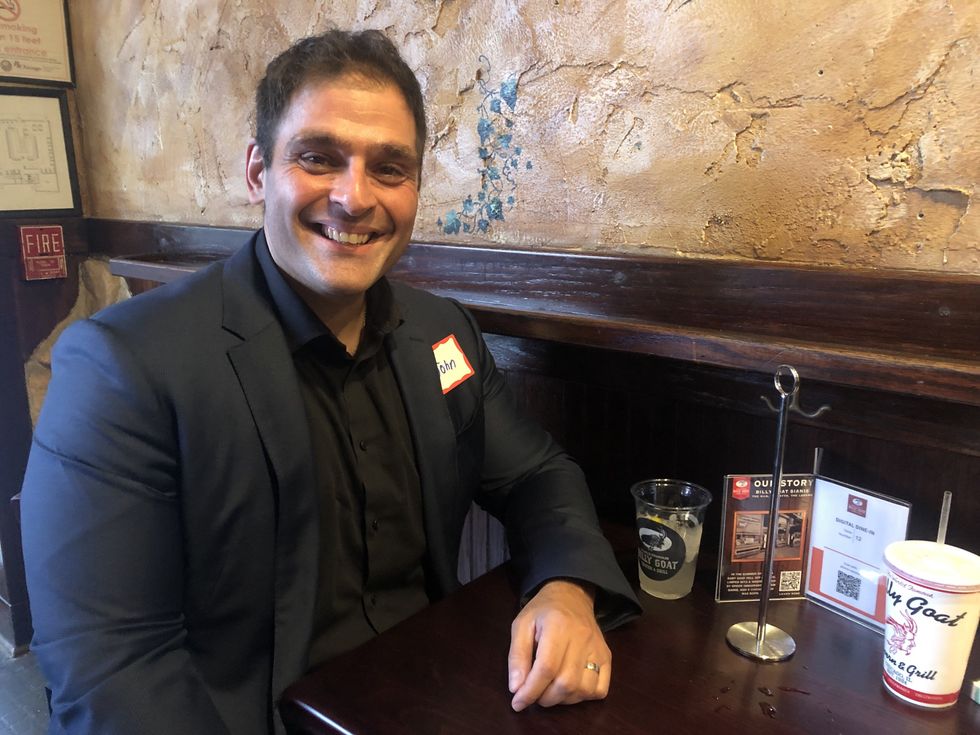 John Booras, Republican candidate for U.S. House Illinois District 3 and tax attorney, at the Billy Goat Tavern in Wrigleyville for a Chicago Republicans event on Aug. 12. (Photo by Alexandria Jacobson/Raw Story)
John Booras, Republican candidate for U.S. House Illinois District 3 and tax attorney, at the Billy Goat Tavern in Wrigleyville for a Chicago Republicans event on Aug. 12. (Photo by Alexandria Jacobson/Raw Story)
Laura Kotelman, a Republican committeeperson for Chicago’s 44th Ward, expressed concern about how the convention will affect her commute downtown for work.
“I don't want to get trapped if there's like roving outages, or they take over Lakeshore Drive. It might be hard to get home,” said Kotelman, recalling protestors’ clash with police at the North Atlantic Treaty Organization summit in Chicago in 2012.
Ken Ashner, who lives in Chicago’s South Loop near McCormick Place, said it’s been “so far so good” in terms of navigating his neighborhood, despite a parking ban outside his home. Ashner said he just needed to show his license to access the designated parking space in his building. but finding parking was a little harder for some of his neighbors.
“I talked to a guy this morning, and he said he had to find a place down a little bit further away, but he found one because they're allowing us to use other neighborhoods,” Ashner said. “Obviously, the street closures we know about, so we’re just going around them.”
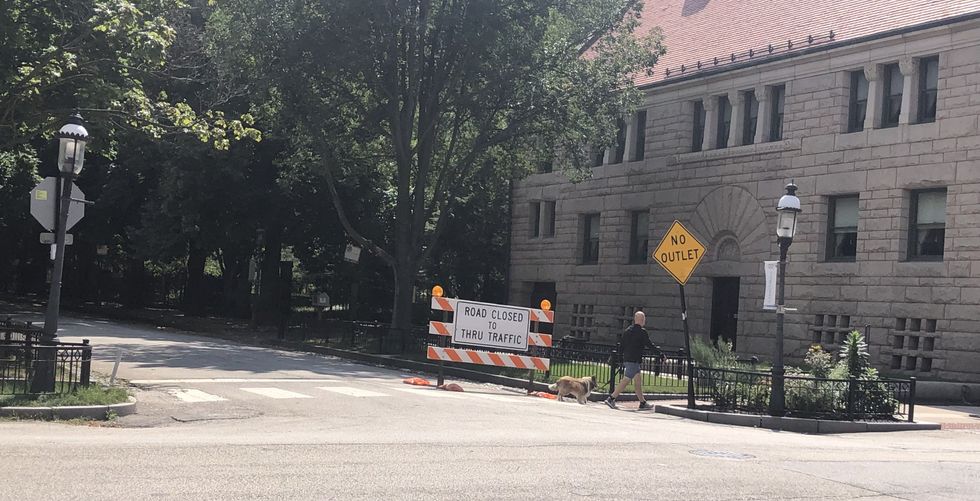 Ken Ashner walks by a street closure in his neighborhood on Aug. 18, 2024. (Photo by Alexandria Jacobson/Raw Story)
Ken Ashner walks by a street closure in his neighborhood on Aug. 18, 2024. (Photo by Alexandria Jacobson/Raw Story)
The Chicago Office of Emergency Management and Communications has released maps of affected areas around the United Center and McCormick Place that includes vehicle check points and limited vehicular traffic throughout a couple blocks around each venue.
Vehicle screenings began as early as Friday near McCormick Place, and street closures near both sites started on Saturday. The convention is scheduled to end on Thursday evening with Vice President Kamala Harris formally accepting the Democratic presidential nomination.
Pat Dowell, alderman for Chicago's 3rd Ward, was unavailable for an interview, and Walter Burnett, Jr., alderman for Chicago's 27th Ward, did not respond to Raw Story's request for comment.



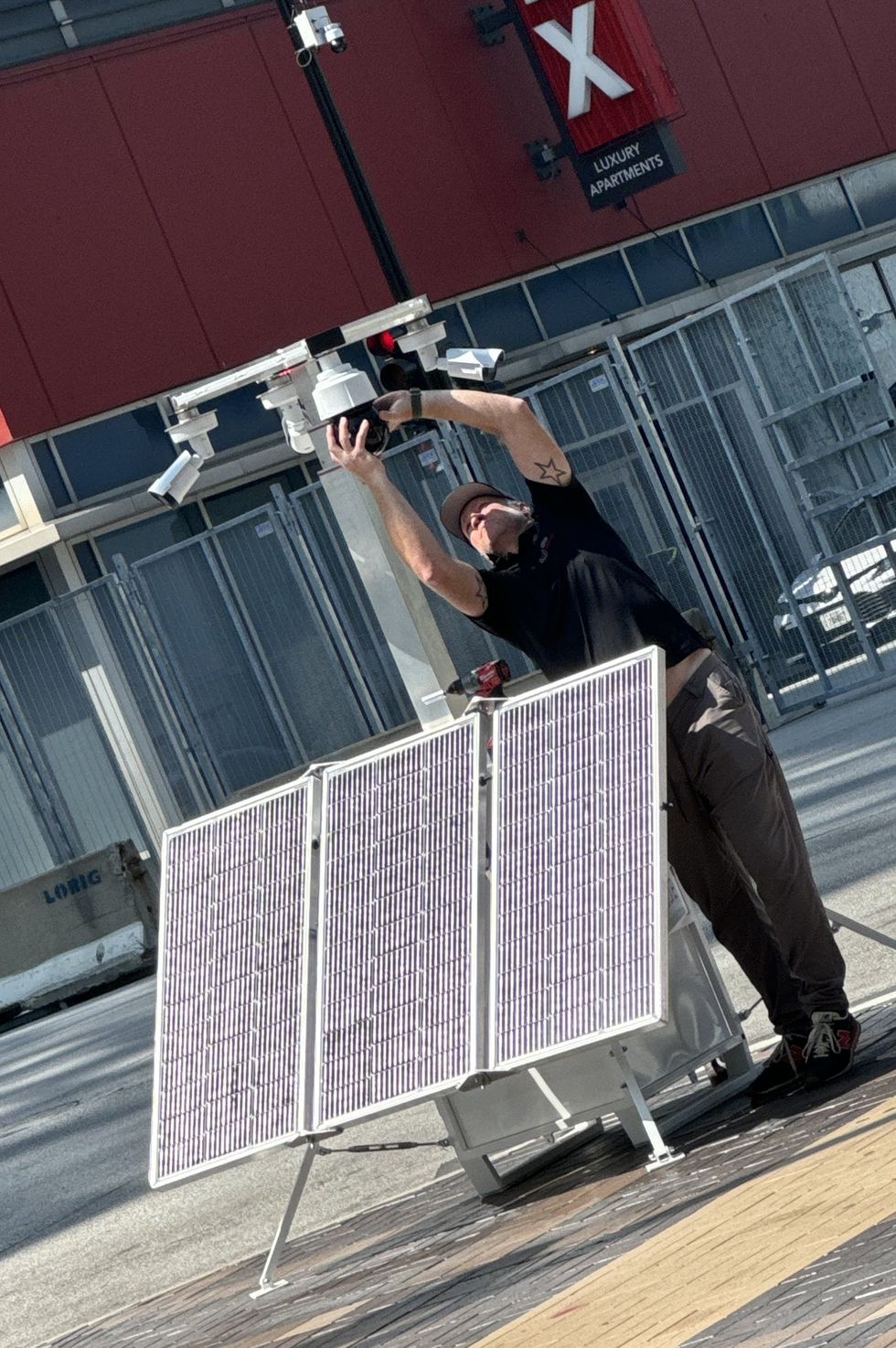 A technician adjusts a solar-powered security camera tower outside McCormick Place in Chicago on Aug. 18, 2024. McCormick Place is hosting many of the daytime events associated with the Democratic National Convention. (Dave Levinthal /
A technician adjusts a solar-powered security camera tower outside McCormick Place in Chicago on Aug. 18, 2024. McCormick Place is hosting many of the daytime events associated with the Democratic National Convention. (Dave Levinthal / 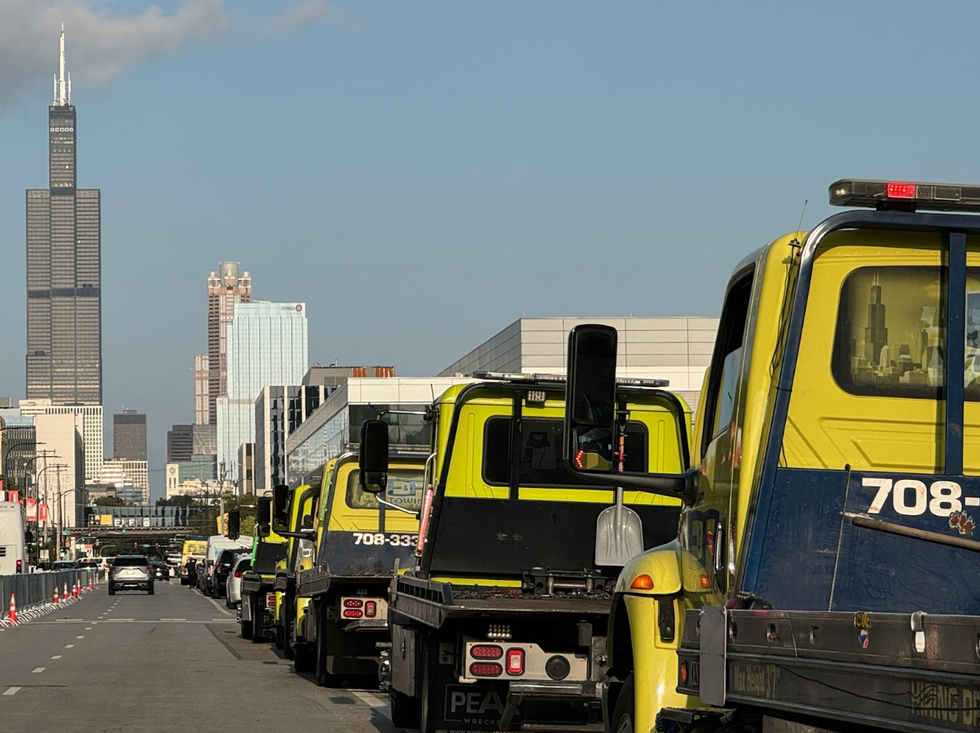 A fleet of tow trucks stand at the ready outside security barriers at Chicago’s United Center for the Democratic National Convention. (Matt Laslo / Raw Story)
A fleet of tow trucks stand at the ready outside security barriers at Chicago’s United Center for the Democratic National Convention. (Matt Laslo / Raw Story)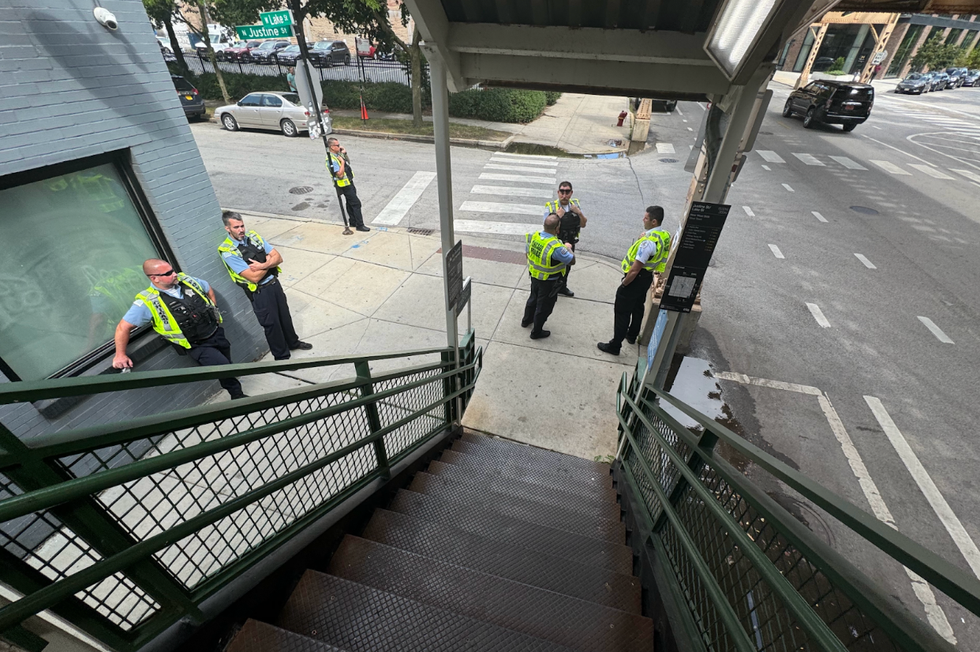 A half-dozen Chicago Police officers stand watch outside the Ashland "L" Train station on Aug. 18, 2024, near the United Center, where the Democratic National Committee's evening events are being conducted. (Dave Levinthal / Raw Story)
A half-dozen Chicago Police officers stand watch outside the Ashland "L" Train station on Aug. 18, 2024, near the United Center, where the Democratic National Committee's evening events are being conducted. (Dave Levinthal / Raw Story)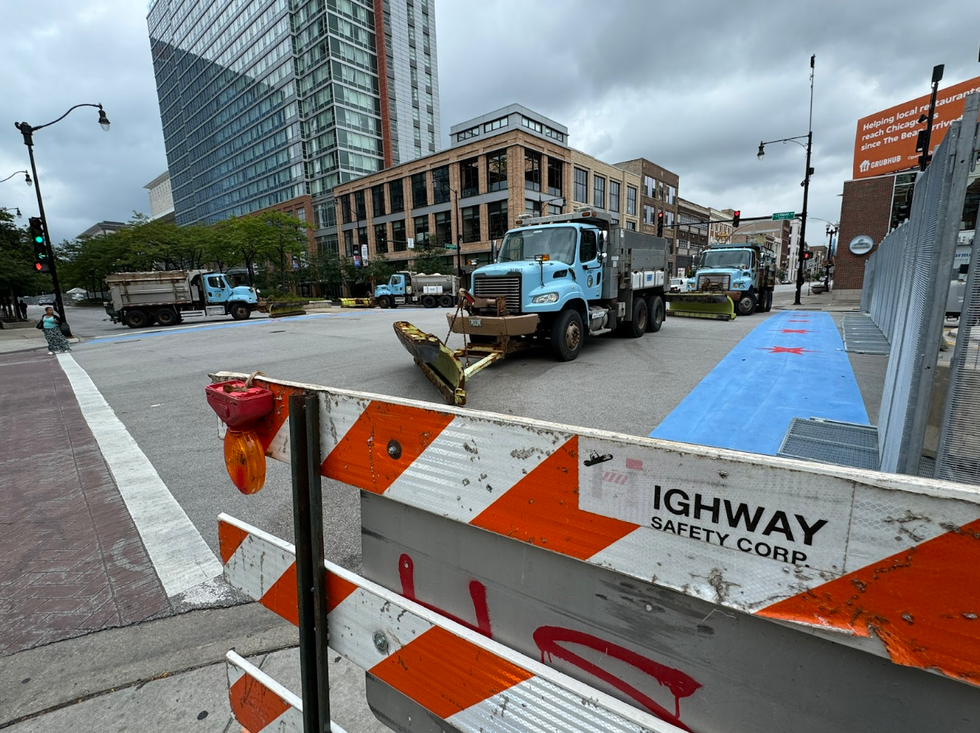 Snowplows are being deployed as extra layers of security across Chicago for the Democratic National Convention. (Matt Laslo / Raw Story)
Snowplows are being deployed as extra layers of security across Chicago for the Democratic National Convention. (Matt Laslo / Raw Story)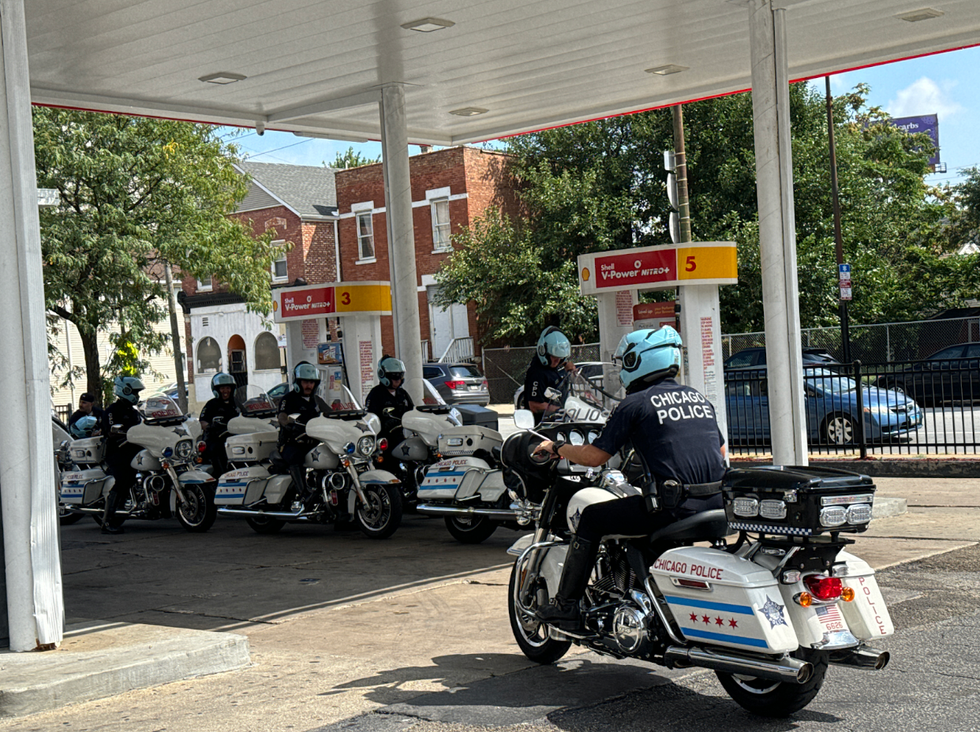 Chicago Police officers fill up their motorcycles during their patrol Sunday afternoon. (Matt Laslo / Raw Story)
Chicago Police officers fill up their motorcycles during their patrol Sunday afternoon. (Matt Laslo / Raw Story)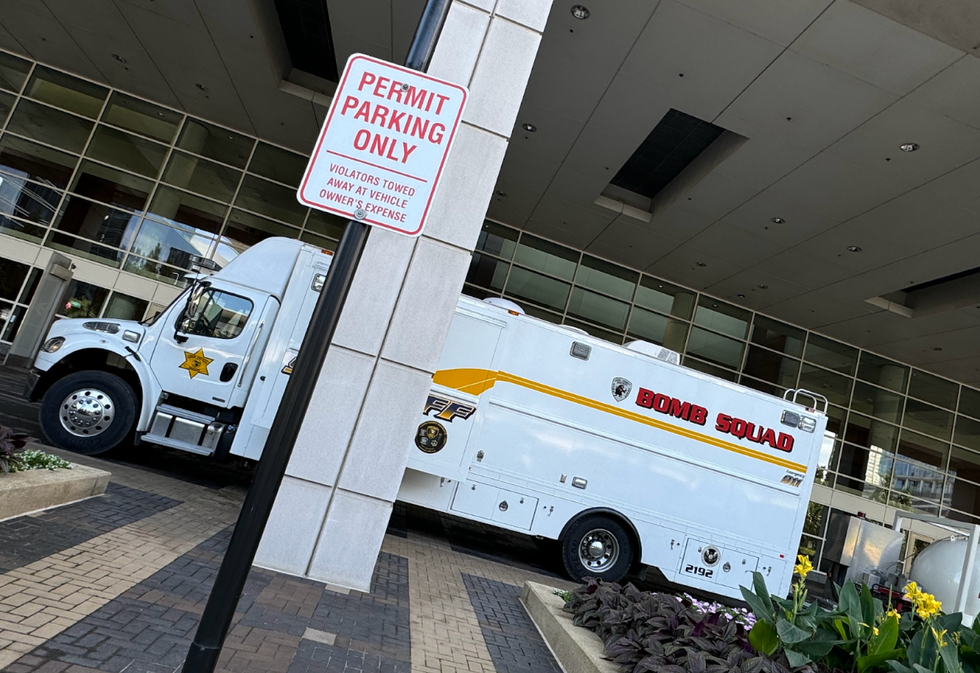 A Cook County, Ill., bomb squad truck is parked outside McCormick Place in Chicago on Aug. 18, 2024. McCormick Place is hosting many of the daytime events associated with the Democratic National Convention. (Dave Levinthal / Raw Story)
A Cook County, Ill., bomb squad truck is parked outside McCormick Place in Chicago on Aug. 18, 2024. McCormick Place is hosting many of the daytime events associated with the Democratic National Convention. (Dave Levinthal / Raw Story) 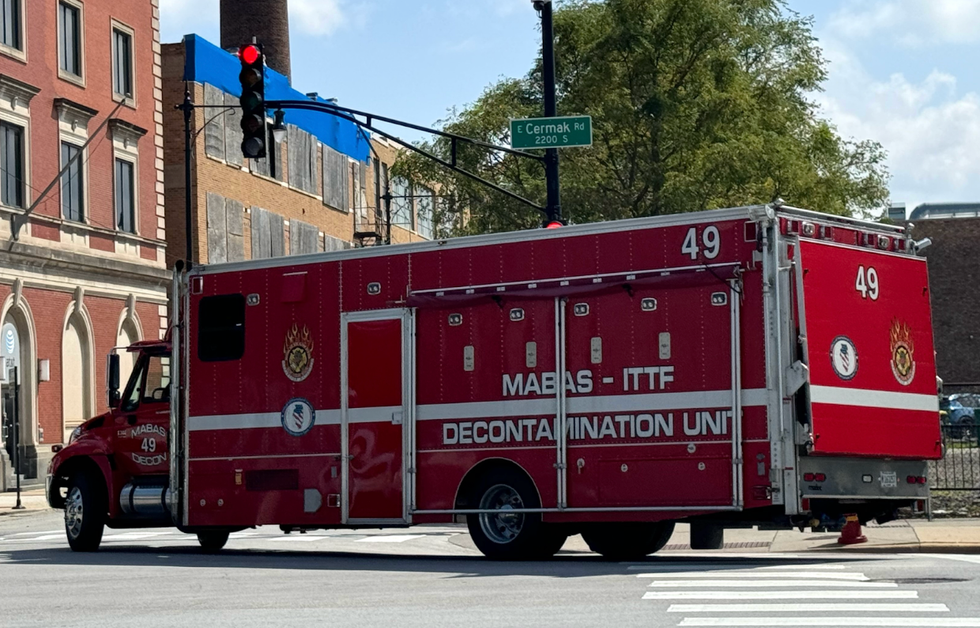 A Mutual Aid Box Alarm System decontamination truck from the Illinois Emergency Management Agency drives around the perimeter of McCormick Place in Chicago on Aug. 18, 2024. McCormick Place is hosting many of the daytime events associated with the Democratic National Convention. (Dave Levinthal / Raw Story)
A Mutual Aid Box Alarm System decontamination truck from the Illinois Emergency Management Agency drives around the perimeter of McCormick Place in Chicago on Aug. 18, 2024. McCormick Place is hosting many of the daytime events associated with the Democratic National Convention. (Dave Levinthal / Raw Story)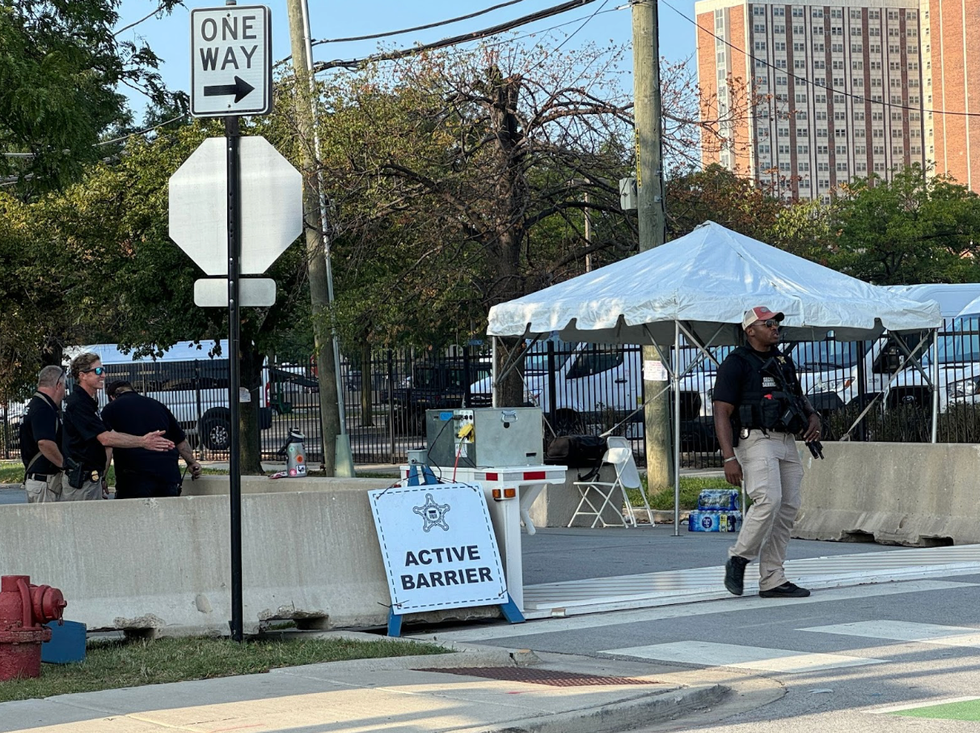 Federal agents running a security checkpoint near the United Center on the afternoon of Aug. 18, 2024. (Matt Laslo / Raw Story)
Federal agents running a security checkpoint near the United Center on the afternoon of Aug. 18, 2024. (Matt Laslo / Raw Story)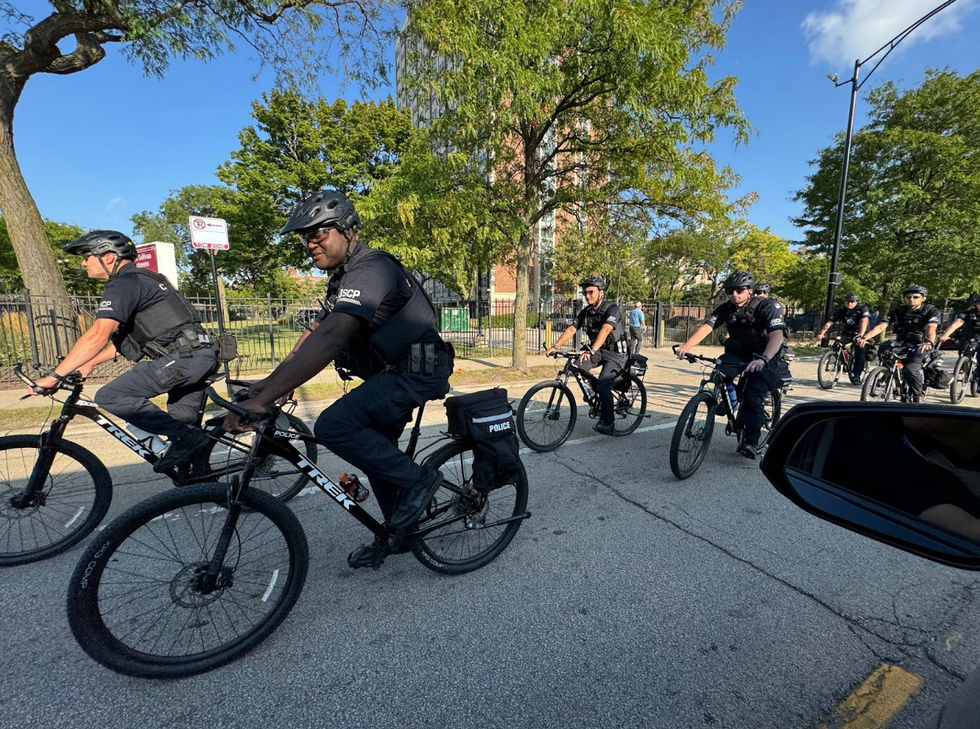 United States Capitol Police patrol the streets around the United Center Sunday. (Matt Laslo / Raw Story)
United States Capitol Police patrol the streets around the United Center Sunday. (Matt Laslo / Raw Story)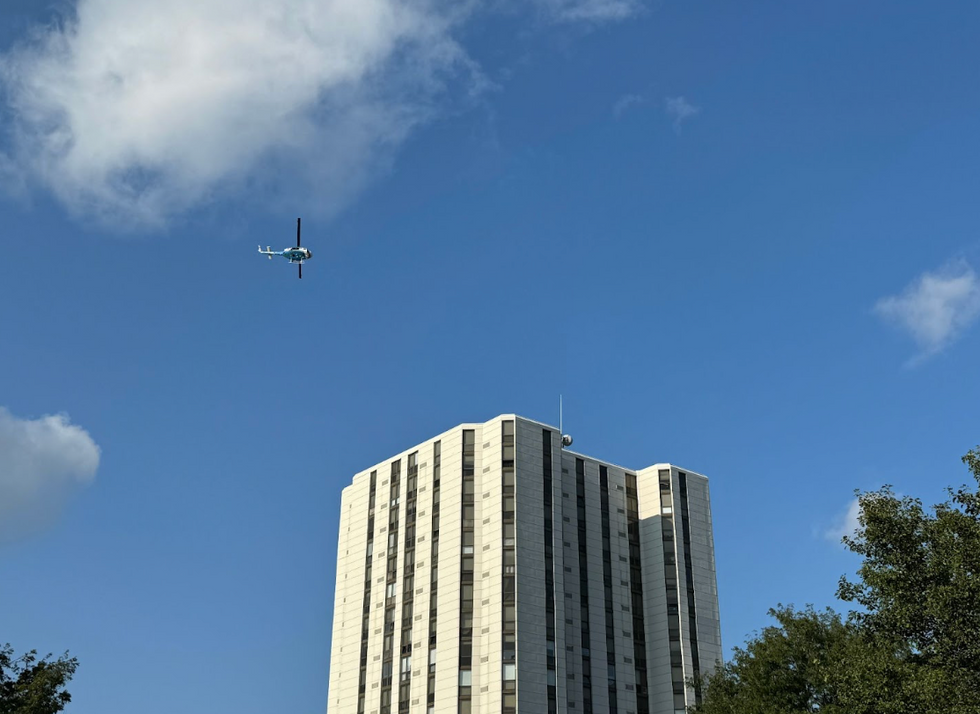 A law enforcement helicopter circles the area around Chicago’s United Center Sunday evening ahead of the Democratic National Convention. (Matt Laslo / Raw Story)
A law enforcement helicopter circles the area around Chicago’s United Center Sunday evening ahead of the Democratic National Convention. (Matt Laslo / Raw Story)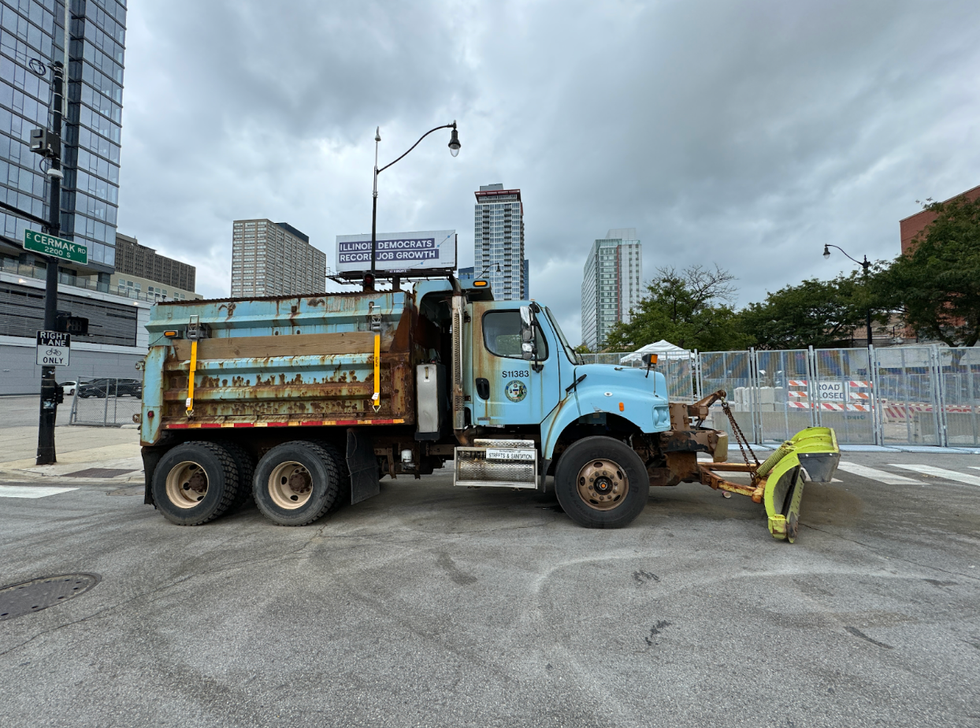 Chicago snowplow turned security barrier. (Matt Laslo / Raw Story)
Chicago snowplow turned security barrier. (Matt Laslo / Raw Story)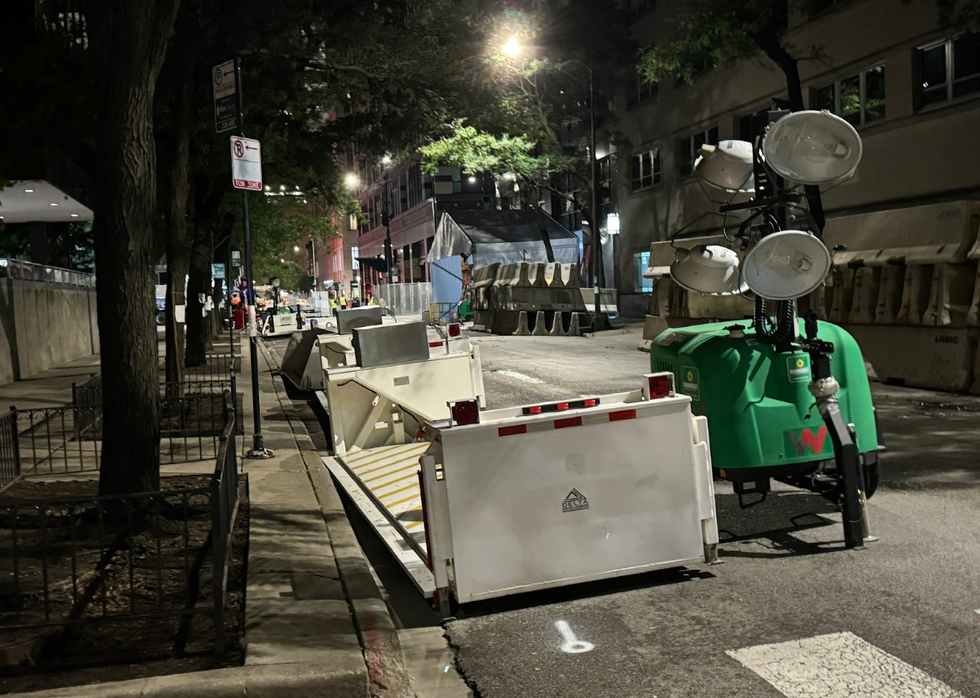 Local and national law enforcement officials and security contractors setting up concrete and steel barriers downtown Chicago at 2 am Sunday morning. (Matt Laslo / Raw Story)
Local and national law enforcement officials and security contractors setting up concrete and steel barriers downtown Chicago at 2 am Sunday morning. (Matt Laslo / Raw Story)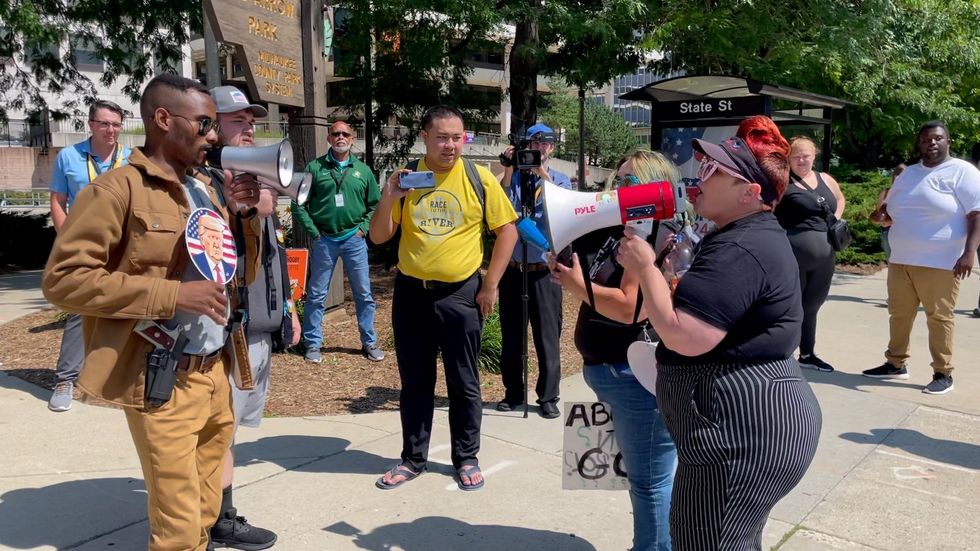 Heather Ryan, a liberal activist from Iowa, and Andre Williams, co-leader of the fascist group New Frontier, face off. (Jordan Green / Raw Story)
Heather Ryan, a liberal activist from Iowa, and Andre Williams, co-leader of the fascist group New Frontier, face off. (Jordan Green / Raw Story)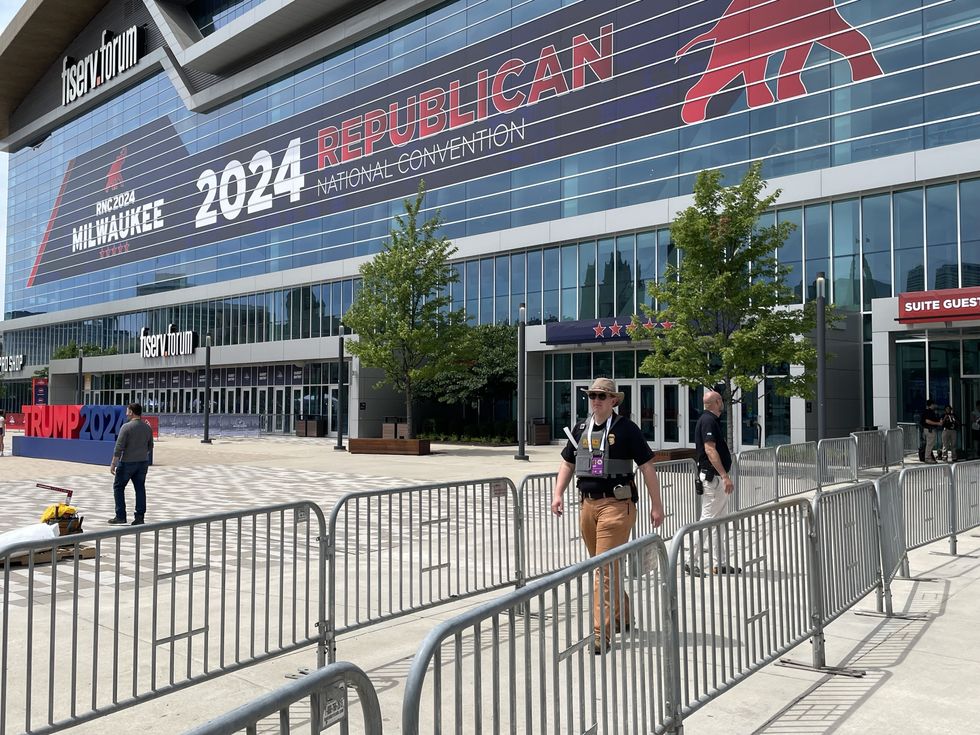 A Homeland Security Investigations agent patrols a security corridor in front of Fiserv Forum.Jordan Green /
A Homeland Security Investigations agent patrols a security corridor in front of Fiserv Forum.Jordan Green / 